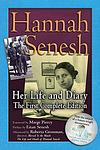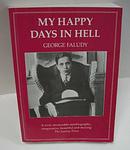The Greatest Hungarian, Colombian "Nonfiction" Books Since 1950
Click to learn how this list is calculated.
This list represents a comprehensive and trusted collection of the greatest books. Developed through a specialized algorithm, it brings together 300 'best of' book lists to form a definitive guide to the world's most acclaimed books. For those interested in how these books are chosen, additional details can be found on the rankings page.
Genres
Countries
Date Range
Reading Statistics
Click the button below to see how many of these books you've read!
Download
If you're interested in downloading this list as a CSV file for use in a spreadsheet application, you can easily do so by clicking the button below. Please note that to ensure a manageable file size and faster download, the CSV will include details for only the first 500 books.
Download-
1. Hannah Senesh by Hannah Senesh
This book is a collection of the diaries, letters, and poems of a young Jewish woman who emigrated from Hungary to Palestine in the 1930s, driven by her Zionist beliefs. She joined the Haganah and later volunteered for a daring military operation to parachute into Nazi-occupied Europe during World War II, with the aim of aiding Allied forces and rescuing Hungarian Jews from the Holocaust. Her writings reflect her courage, literary talent, and the depth of her commitment to her cause. Tragically captured, tortured, and eventually executed by the Nazis, she became an enduring symbol of bravery and sacrifice in the face of tyranny.
-
2. Bezzeg Az én Időmben by Klára Fehér
"Bezzeg Az én Időmben" is a reflective work that delves into the generational differences and societal changes in Hungary, offering a nostalgic look at the past through the lens of personal anecdotes and cultural observations. The book contrasts contemporary life with the experiences of previous generations, exploring themes of family, education, and social norms. It serves as a commentary on the evolution of Hungarian society, inviting readers to consider the implications of progress and the value of tradition in a rapidly changing world.
-
3. My Happy Days In Hell by György Faludy
The book is an autobiographical account of a Hungarian poet's life during the mid-20th century, chronicling his experiences from his carefree youth through the rise of fascism and his subsequent imprisonment in a brutal labor camp. It is a tale of intellectual passion, political upheaval, and the resilience of the human spirit in the face of totalitarianism. The narrative captures the author's journey through a Europe ravaged by war and political strife, his encounters with notable literary figures, and his unyielding commitment to his beliefs and to poetry, even as he endures the hardships and absurdities of a communist regime.
-
4. I Have Lived a Thousand Years by Livia Bitton-Jackson
This memoir tells the harrowing story of a 13-year-old Jewish girl's survival during the Holocaust. The narrative follows her life from her quiet existence in Hungary through the horrors of Auschwitz and other concentration camps, and finally to her liberation and the struggle to rebuild her life in the aftermath of such trauma. The memoir is a powerful testament to human resilience and the will to survive against all odds.
-
5. News Of A Kidnapping by Gabriel García Márquez
The book chronicles the harrowing real-life experiences of several journalists who were kidnapped in Colombia in the early 1990s by the Medellín drug cartel, led by Pablo Escobar. The narrative delves into the psychological and emotional turmoil faced by the hostages and their families, while also exploring the complex political and social landscape of Colombia during this tumultuous period. Through meticulous reporting and personal testimonies, the book sheds light on the pervasive influence of drug cartels on Colombian society and the extreme measures taken by Escobar to leverage his power against the government's extradition policies.
-
6. Lo Que No Tiene Nombre by Piedad Bonnett
The book is a poignant and deeply personal memoir that delves into the heart-wrenching experience of a mother grappling with her son's severe mental illness and eventual suicide. Through a raw and honest narrative, the author explores the complexities of her son's struggle with depression, the impact of his condition on their family, and the profound grief that follows his tragic death. The memoir serves as a meditation on loss, love, and the often misunderstood nature of mental health, offering a touching tribute to her son while also shedding light on the broader issues surrounding mental illness and the challenges faced by those who suffer from it and their loved ones.
-
7. Primera Persona by Margarita García Robayo
"Primera Persona" is a collection of autobiographical essays that delve into the author's experiences navigating the complexities of identity, migration, and cultural dislocation. With sharp wit and unflinching honesty, the author reflects on her life growing up in Colombia, her move to Argentina, and the challenges of establishing herself as a writer in a foreign land. The essays explore themes of family, memory, and the search for belonging, offering a poignant and often humorous look at the intersections of personal history and broader socio-cultural dynamics. Through her narrative, the author invites readers to consider the multifaceted nature of selfhood and the universal quest for connection and understanding.
Reading Statistics
Click the button below to see how many of these books you've read!
Download
If you're interested in downloading this list as a CSV file for use in a spreadsheet application, you can easily do so by clicking the button below. Please note that to ensure a manageable file size and faster download, the CSV will include details for only the first 500 books.
Download




